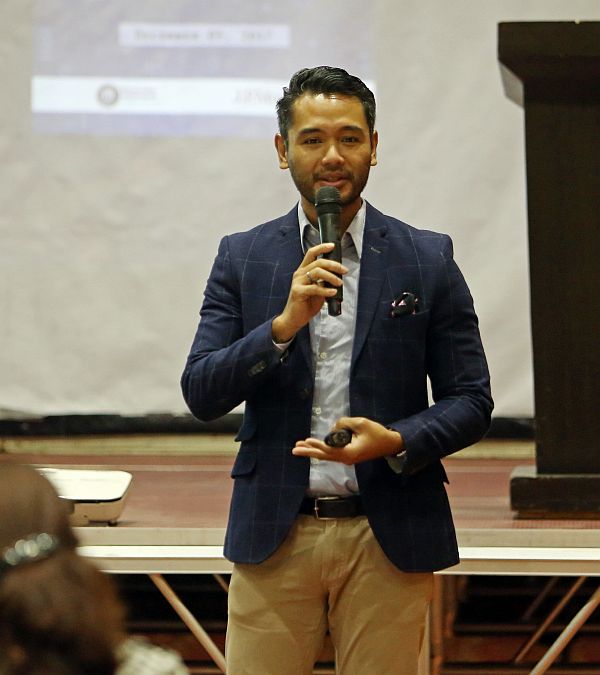
Douglas Yballe, Accenture Phils. managing director, (left photo) discusses technology trends that the Filipinos should watch out during the Creating IT Ecosystem for Innovative Digital Workforce forum at the JCenre Mall. Above, students demonstrate their mini-drone project during last Tuesday’s forum.
CDN PHOTOS/LITO TECSON
Upgrading education in schools to improve students’ skills to match those that are needed in companies today and creating partnerships with different sectors are among the solutions given by the representatives from the academe, the government and industry stakeholders to address the job-skills mismatch issue.
Douglas Yballe, managing director of Accenture Philippines, cited the challenge in education especially with the fast-pace change in today’s technology.
“With the current pace of the change in technology trends the first challenge is education. How do we change the way we educate our students? And second, how do we develop technology in a safe or ethical way?” said Yballe, during a forum last Tuesday where representatives from different sectors in the IT market, academe, government, and non-profit organizations discussed market IT trends and how their establishments could improve the coming digital workforce.
5 technology trends
He cited five 2017 technology trends that Filipinos are ought to keep up with.
These are Artificial Intelligence (AI) is the new User Interface (UI), Ecosystem Power Plays, Workforce Market Place, Design for Humans, and the Uncharted.
Amazon’s Alexa, which is an intelligent personal assistant, is an example of the AI trend.
IT personnel to be more adept and in tune with the trend of going digital is an example for the workforce market place and the Grab and Uber systems for the design for human trend.
For the uncharted trend, Yballe cited as example companies targeting businessmen as their market such as the market for online payments.
Manpower woes
For her part, Mary Jane Sabellano, Computer Science Department chairman of the University of San Carlos, said that the tertiary level is keeping up through updating their current curriculum for the coming Senior Highschool (SHS) graduates but admitted that retaining faculty is a challenge.
“Manpower is the critical part. Our challenge is retaining our faculty. What we’re doing about it is collaborating with the alumni and partner companies to teach the students as well as sending our faculty abroad for their master’s as well as working with the government for scholarships,” she added.
Pastor Ali Najarro, IT Officer of the Department of Education (DepEd) Cebu City Division on the other hand, admitted that they have the biggest challenge.
“It takes eight years before any curriculum changes and that is not enough in the world of IT since it is a fast changing career. Other than that, we rely on the resources the national office gives us which usually mismatch our training for the students. Second is that we lack teachers that caters many students,” he said.
Najarro said that in solution to these challenges, DepEd maintains its partnership with IT companies for the immersion of their students.
Common misconception
Meanwhile, in the business sector, a major challenge is the need for an updated skill for fresh graduates.
“It is common misconception thinking that startup businesses would choose fresh graduates over someone who has had experience for 14 years.
That’s not the case. In IT, we don’t look into educational attainment but in the experience and skills of the applicant. What I can suggest experiential learning.” Said Vince Lorema, Co-founder of Kallfly and Dreamscape.
He later explained that his company organizes the “Start-up weekends program” where entrepreneurs, students and IT personnel are introduced to new and modern IT to improve their skills.
Orville Avila, Business Application Manager of Aboitiz Equity Ventures, has a different challenge on hand. It is the adaptation of employees to the introduction of new technology like cloud, where no servers are needed and costs less. To cope this, the company trains remaining employees to learn how to adapt to the change.
CIB.O’s career caravan
Lastly, Jun Saa, managing director of Cebu IT-Business Process Management (BPM).Organization (CIB.O), a non-profit organization, said that their contribution to the solution of the dilemma above is the organization of a career caravan where they visited 20 public schools with SHS inviting the students to IT careers.
The forum was organized by Passerelles Numériques and J.P. Morgan was entitled: “Creating IT Ecosystem for Innovative Digital Workforce.”